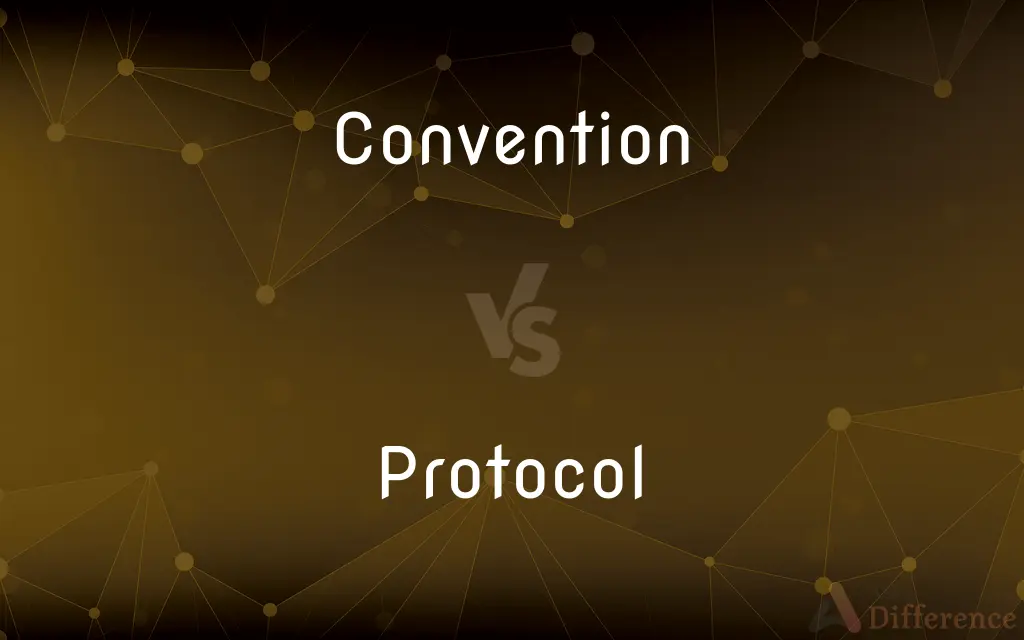Convention vs. Protocol — What's the Difference?
By Tayyaba Rehman & Maham Liaqat — Updated on April 17, 2024
A convention is a broad agreement or treaty that establishes general principles or frameworks, while a protocol is a more detailed document that outlines specific procedures or standards within the framework of a convention.

Difference Between Convention and Protocol
Table of Contents
ADVERTISEMENT
Key Differences
Conventions are international agreements that set broad objectives and principles on various issues like human rights, environmental protection, or international trade. They provide a general framework for countries to follow and often require ratification by participating states. In contrast, protocols are supplementary agreements that detail specific rules and procedures needed to implement the broader principles outlined in a convention.
For example, in environmental law, the Kyoto Protocol sets specific targets for greenhouse gas reductions and is a protocol to the United Nations Framework Convention on Climate Change (UNFCCC), which establishes a general framework for addressing climate change. This relationship highlights how protocols serve to operationalize the intentions of a convention.
Conventions often need protocols to adapt their broad principles to specific situations or to include detailed standards and compliance mechanisms that were not originally specified. On the other hand, protocols rely on the foundational principles set by conventions to ensure their relevance and enforceability.
In terms of adoption, conventions usually require a higher level of consensus among a wide range of parties, which can make them somewhat general and flexible. Protocols, however, can be more specific and may include technical standards that only some of the original signatories of the convention agree to adopt, allowing for a more tailored approach to complex issues.
Both conventions and protocols are binding on the parties that ratify them, but the specific commitments and actions are often more clearly defined in protocols. This detailed nature of protocols helps in creating more effective monitoring and compliance mechanisms compared to the broader language often found in conventions.
ADVERTISEMENT
Comparison Chart
Definition
Broad agreement setting general principles
Detailed agreement outlining specific standards
Example
United Nations Framework Convention on Climate Change
Kyoto Protocol
Purpose
Establishes a general framework for action
Provides specific procedures for implementation
Adoption
Requires broad consensus
May be adopted by a subset of the original parties
Legal Nature
Binding, but often general
Binding, with specific commitments
Compare with Definitions
Convention
Serves as a framework for further agreements.
The Convention on the Rights of the Child provides a basis for more detailed protocols on children's rights.
Protocol
A detailed agreement related to a convention.
The Montreal Protocol on substances that deplete the ozone layer details specific actions to phase out these substances.
Convention
An agreement between countries that sets general principles.
The Geneva Conventions establish international legal standards for humanitarian treatment in war.
Protocol
Can be optional, with parties choosing to adopt.
Some countries may opt into specific protocols while abstaining from others due to differing national interests or capabilities.
Convention
Often outlines broad objectives to be achieved.
The Convention on Biological Diversity aims to conserve biological diversity, use its components sustainably, and share benefits.
Protocol
Aims to implement and operationalize a convention's goals.
Protocols are designed to make the broad principles of conventions actionable and enforceable.
Convention
Requires ratification by signatories to become legally binding.
After ratification, countries are legally bound to adhere to the principles of the convention.
Protocol
Developed in specialized follow-up meetings.
Protocols may be negotiated in meetings focusing on specific aspects of a convention, like climate change mitigation.
Convention
Usually adopted at large international conferences.
The Ramsar Convention on Wetlands was adopted to provide the framework for national action and international cooperation for the conservation of wetlands.
Protocol
Specifies exact procedures or standards.
Protocols often set precise technical or operational standards that parties must follow.
Convention
A formal meeting of members, representatives, or delegates, as of a political party, fraternal society, profession, or industry.
Protocol
The official procedure or system of rules governing affairs of state or diplomatic occasions
Protocol forbids the prince from making any public statement in his defence
Convention
The body of persons attending such an assembly
Called the convention to order.
Protocol
The original draft of a diplomatic document, especially of the terms of a treaty agreed to in conference and signed by the parties
Hungary and the Soviet Union signed a trade protocol
Signatories to the Montreal Protocol
Convention
An agreement between states, sides, or military forces, especially an international agreement dealing with a specific subject, such as the treatment of prisoners of war.
Protocol
A formal or official record of scientific experimental observations
Protocols of published cases frequently lack this vital information
Convention
General agreement on or acceptance of certain practices or attitudes
By convention, north is at the top of most maps.
Protocol
A set of rules governing the exchange or transmission of data between devices.
Convention
A practice or procedure widely observed in a group, especially to facilitate social interaction; a custom
The convention of shaking hands.
Protocol
The forms of ceremony and etiquette observed by diplomats and heads of state.
Convention
A widely used and accepted device or technique, as in drama, literature, or painting
The theatrical convention of the aside.
Protocol
A code of correct conduct
Safety protocols.
Academic protocol.
Convention
A meeting or gathering.
The convention was held in Geneva.
Protocol
The first copy of a treaty or other such document before its ratification.
Convention
A formal deliberative assembly of mandated delegates.
The EU installed an inter-institutional Convention to draft a European constitution.
Protocol
A preliminary draft or record of a transaction.
Convention
The convening of a formal meeting.
Protocol
The plan for a course of medical treatment or for a scientific experiment.
Convention
A formal agreement, contract, rule, or pact.
Protocol
(Computers) A standard procedure for regulating data transmission between computers.
Convention
(international law) A treaty or supplement to such.
The Vienna convention at the Vienna Congress (1814-15) standardized most of diplomatic conduct for generations.
Protocol
To form or issue protocols.
Convention
A practice or procedure widely observed in a group, especially to facilitate social interaction; a custom.
Table seatings are generally determined by tacit convention, not binding formal protocol.
The convention of driving on the right is reinforced by law.
Protocol
The minutes, or official record, of a negotiation or transaction; especially a document drawn up officially which forms the legal basis for subsequent agreements based on it.
Convention
The act of coming together; the state of being together; union; coalition.
The conventions or associations of several particles of matter into bodies of any certain denomination.
Protocol
An official record of a diplomatic meeting or negotiation; later specifically, a draft document setting out agreements to be signed into force by a subsequent formal treaty.
Convention
General agreement or concurrence; arbitrary custom; usage; conventionality.
There are thousands nowSuch women, but convention beats them down.
Protocol
(international law) An amendment to an official treaty.
Convention
A meeting or an assembly of persons, esp. of delegates or representatives, to accomplish some specific object, - civil, social, political, or ecclesiastical.
He set himself to the making of good laws in a grand convention of his nobles.
A convention of delegates from all the States, to meet in Philadelphia, for the sole and express purpose of reserving the federal system, and correcting its defects.
Protocol
The first leaf of a roll of papyrus, or the official mark typically found on such a page.
Convention
An extraordinary assembly of the parkiament or estates of the realm, held without the king's writ, - as the assembly which restored Charles II. to the throne, and that which declared the throne to be abdicated by James II.
Our gratitude is due . . . to the Long Parliament, to the Convention, and to William of Orange.
Protocol
The official formulas which appeared at the beginning or end of certain official documents such as charters, papal bulls etc.
Convention
An agreement or contract less formal than, or preliminary to, a treaty; an informal compact, as between commanders of armies in respect to suspension of hostilities, or between states; also, a formal agreement between governments or sovereign powers; as, a postal convention between two governments.
This convention, I think from my soul, is nothing but a stipulation for national ignominy; a truce without a suspension of hostilities.
The convention with the State of Georgia has been ratified by their Legislature.
Protocol
(sciences) The original notes of observations made during an experiment; also, the precise method for carrying out or reproducing a given experiment.
Convention
A large formal assembly;
Political convention
Protocol
The official rules and guidelines for heads of state and other dignitaries, governing accepted behaviour in relations with other diplomatic representatives or over affairs of state.
Convention
Something regarded as a normative example;
The convention of not naming the main character
Violence is the rule not the exception
His formula for impressing visitors
Protocol
An accepted code of conduct; acceptable behaviour in a given situation or group.
Convention
(diplomacy) an international agreement
Protocol
(computing) A set of formal rules describing how to transmit or exchange data, especially across a network.
Convention
Orthodoxy as a consequence of being conventional
Protocol
(medicine) The set of instructions allowing a licensed medical professional to start, modify, or stop a medical or patient care order.
Convention
The act of convening
Protocol
To make a protocol of.
Protocol
To make or write protocols, or first drafts; to issue protocols.
Protocol
The original copy of any writing, as of a deed, treaty, dispatch, or other instrument.
Protocol
The minutes, or rough draught, of an instrument or transaction.
Protocol
A preliminary document upon the basis of which negotiations are carried on.
Protocol
To make a protocol of.
Protocol
To make or write protocols, or first draughts; to issue protocols.
Protocol
(computer science) rules determining the format and transmission of data
Protocol
Forms of ceremony and etiquette observed by diplomats and heads of state
Protocol
Code of correct conduct;
Safety protocols
Academic protocol
Common Curiosities
Can a protocol exist without a convention?
Typically, protocols are tied to conventions and serve to further detail or implement the convention’s objectives.
How do conventions and protocols influence international law?
Both play crucial roles in shaping international norms and laws, with conventions establishing general legal frameworks and protocols providing the detailed rules necessary for implementation.
How does a country adopt a convention or protocol?
Countries adopt conventions and protocols through ratification, which often requires approval by the nation's legislative body.
Are protocols always legally binding?
Protocols are legally binding to those parties that ratify them, much like conventions.
What role do NGOs play in the development of conventions and protocols?
NGOs often provide expertise, raise public awareness, and lobby for specific standards to be included in both conventions and protocols.
Can a country be a part of a convention but not its protocol?
Yes, countries may choose to ratify a convention but not participate in one or more of its associated protocols.
How are disputes regarding the interpretation of conventions and protocols resolved?
Disputes are typically resolved through international courts or arbitration bodies, depending on the mechanisms outlined in the agreements.
What is the main purpose of a convention compared to a protocol?
A convention sets broad principles and a framework, while a protocol details specific actions and standards within that framework.
What happens if a country violates a convention or protocol?
Violations can lead to international disputes, potential sanctions, or other forms of diplomatic or economic pressure.
How do new scientific findings influence conventions and protocols?
New scientific insights can prompt updates to conventions and the drafting of new protocols to address emerging challenges.
Share Your Discovery

Previous Comparison
Sculpture vs. Architecture
Next Comparison
Percentage vs. PercentileAuthor Spotlight
Written by
Tayyaba RehmanTayyaba Rehman is a distinguished writer, currently serving as a primary contributor to askdifference.com. As a researcher in semantics and etymology, Tayyaba's passion for the complexity of languages and their distinctions has found a perfect home on the platform. Tayyaba delves into the intricacies of language, distinguishing between commonly confused words and phrases, thereby providing clarity for readers worldwide.
Co-written by
Maham Liaqat













































